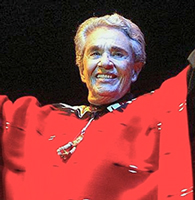



Vargas brought to “ranchera,” a traditional Mexican song genre, a unique and heart-wrenching interpretation. Mexican writer, critic and social activist Carlos Monsiváis described this on the liner notes of the CD “Chavela at Carnegie Hall” as “a dimension in which music and lyrics conspire to elicit late-night confessions, incinerated intimate secrets, and hallucinations of desire.”
Spanish director Pedro Almodóvar, who featured Vargas’ singing in some of the films he directed, described her sound as “la voz áspera de la ternura” (“the rough voice of tenderness”). In Julie Taymor’s 2002 film “Frida,” Vargas sings the Mexican classic rancheras “La Llorona” and “Paloma Negra.”
Many of the written appreciations of Vargas’ life note that she only came out publicly as a lesbian at the age of 81 in her autobiography, “Y si quieres saber de mi pasado” (“And If You Want to Know about My Past”).
Well, O.K. But lesbian, gay, bisexual, transgender and queer people across the globe know from their own life experiences that coming out is usually a lifelong process, a recurring challenge in each new social situation. For those who can’t easily “pass,” it is usually something they cannot avoid on a daily basis, and it is fraught with difficulties. For Vargas, it was most probably the latter. “What hurt was not being homosexual,” she wrote, “but [that] they throw it in my face as if it were the plague.”
Brushing aside the condemnations, Vargas strode forth in public attired in clothes strictly reserved for Mexican men. She smoked cigars. At public performances, she refused to change the gender-specific words that made clear that her love songs were addressed to women. And her affairs with women were widely known.
Vargas’ art caressed the hearts of millions of people of all sexualities and genders throughout Latin America and beyond. Her reception by New York City’s Latina lesbian community at Carnegie Hall in 2002 was nothing short of stupendous.
‘An example of strength & dignity’
Vargas accurately described herself as a shaman. The tribal groupings of pre-Columbian Mesoamerica, like most communal and early class societies around the world, had among their leading figures women and men, often transgender, often homosexual or bisexual. These figures were held in special esteem for their spiritual and healing abilities and for their farsighted wisdom. Vargas was certainly deeply spiritual, wise in matters of the heart, and her art was healing in the most profound sense of the word.
Her circle of friends over the years included other gifted Mexican artists, among them writer Juan Rulfo, composer Agustín Lara, muralist Diego Rivera, and painter and activist Frida Kahlo. Vargas’ artistry, her many concert performances and over 80 recorded albums were publicly recognized with many honors and awards, both in Mexico and internationally.
The final dream of her life was to pay homage to the life and work of Federico García Lorca, the great gay Spanish poet, who was assassinated by fascists in 1936 during the Spanish Civil War. There were reports in some articles that Vargas had known Lorca in the years before his death. It was obvious that she identified closely with the poet’s life and his work.
She fulfilled her dream with a month-long tour of Spain, where she promoted her final CD, “La luna grande” (“The big moon”), which was dedicated to Lorca, and also the publication of her memoir, “Dos vidas necesito. Las verdades de Chavela” (‘I need two lives. Chavela’s truths’). Already seriously ill toward the end of the tour, she returned to Mexico from this mission on July 26. (Granma Internacional, Aug. 6)
Hospitalized in Cuernavaca and near death, Vargas rejected any invasive methods that might be used to try to prolong her life. Her last words were, “Me voy con México en el corazón” (“I leave with Mexico in my heart”). Her friend and biographer, María Cortina, was with her at the end and commented, “Murió como vivió, dándonos ejemplo de fortaleza y de dignidad” (“She died as she lived, giving us an example of strength and dignity”). (teleSUR, Aug. 6)
Download the PDF Farmworkers organize three-day strike Palestinian factions demand an end to the famine…
In the more than 650 days since the Al-Aqsa Flood (October 7, 2023), a remarkable…
Special to Workers World Hosted by Panda Aid (China) and co-organized by the International Action…
The following statement summaries were posted July 18, 2025, on Resistance News Network. Palestinian factions…
“What hypocrisy that the maker of F-35 fighter jets, attack helicopters, missiles and bombs that…
At 10:20 a.m. on July 10, some 500 community supporters responded to a Rapid Response…